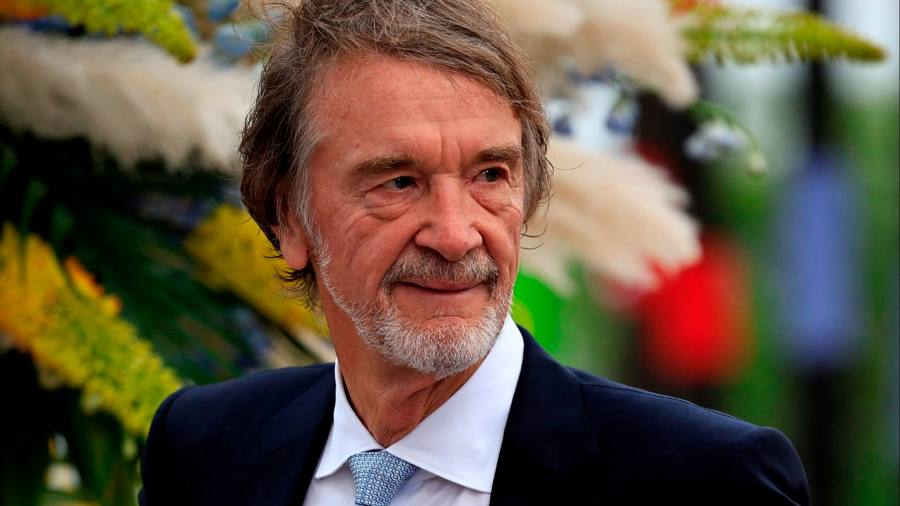
Receive free Jim Ratcliffe updates
We’ll send you a myFT Daily Digest email rounding up the latest Jim Ratcliffe news every morning.
Sir Jim Ratcliffe, the owner of chemicals giant Ineos, has accused Britain’s competition regulator of becoming “increasingly hostile to business” after it blocked its purchase of assets being sold by a Swiss group.
Ratcliffe said the decision by the Competition and Markets Authority to block the deal with Switzerland’s Sika earlier this year was “yet another example of a deal being stopped that would benefit the UK”.
“Add to this, the ridiculous North Sea windfall tax and continuing high energy costs and we are seeing a government that is driving business out of the UK,” he said on Tuesday.
Ratcliffe, one of the UK’s richest men who is also in the race to buy Manchester United football club, is the latest to criticise what some executives view as an increasingly aggressive stance by the CMA. Activision Blizzard, the video games maker, branded Britain as “closed for business” earlier this year after the regulator blocked its acquisition by Microsoft.
The CMA said that estimates showed that during the past 3 years, it had saved consumers more than £2bn through its merger regulation as well as enabling UK businesses to enter new markets and grow.
“It is critical when approving a potential buyer that we don’t allow new competition problems to develop. We note that Ineos is one of only three major suppliers of a key product that Sika and its competitors rely on,” it added.
Ineos agreed in January to purchase Sika’s concrete additives business which had sales of $1bn. The Swiss speciality chemicals group was selling the assets to mollify CMA concerns stemming from its SFr5.5bn ($6.1bn) acquisition of MBCC Group, a supplier of construction chemicals, in November 2021.
Sika said in March that it had agreed with Ineos to scrap the deal after receiving “provisional negative feedback” from the CMA due to competition concerns. Private equity firm Cinven acquired the assets instead.
Ratcliffe said the CMA was “building a reputation as an overly aggressive regulator with little regard for the impact of its decisions on UK business”.
He added: “Its attitude is mirrored in the lack of government support for manufacturing; whether in reviews such as this, or in our uncompetitive approach to energy policy.”
Ratcliffe’s damning verdict of the CMA is the latest in a series of scathing attacks on the UK government and the state of manufacturing. He singled out the decision to raise the tax on North Sea oil and gas producers in an interview with the Financial Times in May, accusing the government of playing “primitive politics”.
One of Britain’s most successful postwar industrialists, Ratcliffe founded Ineos in 1998 with Andy Currie and John Reece. In the first 10 years, the company made more than 20 acquisitions, snapping up unloved commodity businesses from the likes of ICI, BP and BASF as these giants restructured.
Today the group’s activities span oil and gas fields, refineries and chemical works. Ratcliffe’s business empire includes several consumer brands and sports interests including football club OGC Nice, a stake in the Mercedes-AMG Petronas Formula One racing team and the off-road Grenadier 4×4 vehicle.
Ratcliffe, who is the majority owner of Ineos, has also bid to acquire Manchester United, one of the world’s most famous football clubs, from its American owners. The FT has previously reported that the Ineos proposal was to acquire control of United from the Glazers but without extending an offer to minority shareholders of the New York-listed club.
However, the structure of Ratcliffe’s proposal has drawn concern from the club’s board and minority shareholders, according to people with knowledge of the matter. Sheikh Jassim bin Hamad al-Thani, the son of one of Qatar’s richest men, has proposed a full takeover and sweetened his offer in early June but the process has dragged on since the Glazers first said last November that they would consider a sale.
A deal would be Ratcliffe’s highest-profile acquisition in sports, adding to a collection of assets that includes a high-profile cycling team, French football club Nice and a third of the Mercedes F1 racing outfit. He previously failed in attempts to acquire Chelsea FC.